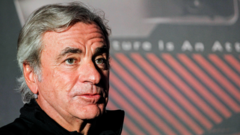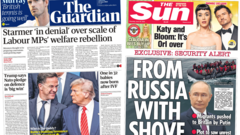Is Carlos Sainz's FIA Presidency Bid Off the Table?

Carlos Sainz: A Rally Legend's Decision Not to Pursue FIA Presidency
In the world of motorsport, few names resonate with as much reverence and acclaim as that of Carlos Sainz. A two-time World Rally Champion, Sainz has not only cemented his legacy through his impressive performances on the rally stages but also through his profound understanding of the sport. However, in a recent turn of events, the 63-year-old has made headlines once again, not for his racing prowess, but for his announcement regarding the upcoming FIA presidential election.
In this article, we explore Sainz's decision to step back from running for the presidency of the FIA, the implications of his choice, and the current state of motorsport governance as it relates to the FIA. Through this discussion, we aim to shed light on the challenges that both Sainz and the FIA face, and what this means for the future of motorsport.
Background: Carlos Sainz’s Legacy in Motorsport
Carlos Sainz is not just a name; he is a symbol of resilience and excellence in the world of rally racing. Born in Madrid, Spain, Sainz's journey in motorsport began in the mid-1980s, and he quickly gained recognition for his skill behind the wheel. His triumphs in the World Rally Championship (WRC) in 1990 and 1992 solidified his status as one of the sport’s greats.
Beyond his WRC success, Sainz has also made a significant mark in the Dakar Rally, where he has claimed victory four times, showcasing his versatility and adaptability in different racing environments. His continued participation in the Dakar Rally, particularly with Ford, highlights his enduring passion for the sport.
The Decision to Withdraw from the FIA Presidential Race
In May 2023, Sainz hinted at the possibility of running for the presidency of the FIA, the governing body of motorsport worldwide. However, in a recent statement via social media, he announced his decision not to pursue this path. Sainz cited that "the present circumstances are not ideal to set the grounds for my candidacy," reflecting a thoughtful consideration of the current state of the FIA and his priorities.
His statement also emphasized the need for significant changes within the FIA, expressing hope that these issues will be addressed in the coming years. Sainz's commitment to his role in the Dakar Rally played a crucial part in his decision. He stated, "I have realized that properly running for president would notably compromise my preparation for the Dakar, and I do not wish to weaken my commitment to Ford and my team."
Factors Influencing Sainz's Decision
Several factors influenced Sainz's decision not to pursue the FIA presidency:
- Commitment to Racing: Sainz’s focus on the Dakar Rally and his responsibilities with his team were paramount. The rigorous preparation required for such a demanding event would leave little room for a political campaign.
- Current State of the FIA: Sainz expressed concerns regarding the governance of the FIA, indicating that he did not want to step into a role that might not allow for the changes he believes are necessary.
- Personal Reflection: Sainz’s decision reflects a mature understanding of his priorities, choosing to remain committed to his racing career rather than getting embroiled in the complexities of motorsport politics.
The Current Landscape of FIA Governance
As Sainz steps back, the FIA presidency is currently held by Mohammed Ben Sulayem, who has faced a series of controversies during his tenure. These issues include concerns over changes to the FIA statutes, which many believe extend his control over the organization.
Moreover, Ben Sulayem's leadership has been marred by a string of high-profile departures within the FIA, raising questions about the internal governance and decision-making processes. His involvement in contentious situations with major players in Formula 1, such as commercial rights holder Liberty Media and various drivers, has further complicated his presidency.
Key Controversies Surrounding Mohammed Ben Sulayem
Several key controversies characterize Ben Sulayem's presidency:
- Statutory Changes: Modifications to the FIA’s governing statutes have sparked criticism, with many stakeholders concerned about the implications for transparency and accountability.
- High-Profile Departures: The dismissal of senior figures within the FIA has raised eyebrows and led to questions about leadership stability.
- Conflict with F1 Stakeholders: Tensions between the FIA and Formula 1 participants have escalated, particularly surrounding issues of commercial rights and governance.
The Future of Motorsport Governance
As the FIA approaches its upcoming election, stakeholders within the motorsport community will be closely watching for potential candidates and their platforms. With Sainz stepping back, the field remains open, and the future direction of the FIA hangs in the balance.
The need for reform within the FIA has never been more urgent. A transparent and accountable governance structure is vital for the continued growth and integrity of motorsport. The challenges faced by the FIA require leaders who are not only experienced in the sport but also committed to fostering a collaborative and innovative environment.
Potential Candidates and Their Impacts
As of now, the only declared candidate for the FIA presidency is Mohammed Ben Sulayem. However, there is speculation about other potential candidates who may emerge as the election date approaches. Each candidate will bring their own vision and priorities, and their success will depend on their ability to address the pressing issues the FIA is facing.
Carlos Sainz: A Symbol of Commitment to Motorsport
Carlos Sainz's decision not to run for FIA president reflects his deep-rooted commitment to motorsport, particularly as he prepares for the challenging Dakar Rally. His legacy as a rally driver and his understanding of the intricacies of motorsport governance make his views on the FIA particularly significant.
While he may not be seeking a political role, Sainz remains an influential figure in the world of motorsport. His thoughts on the need for change within the FIA resonate with many stakeholders who are eager to see progress in governance and transparency.
Conclusion: Looking Ahead
The motorsport community is at a crossroads as it navigates the complexities of governance and leadership. Carlos Sainz's decision not to run for the FIA presidency may have been a personal choice, but it underscores the importance of having dedicated and capable leaders in the sport. The upcoming election presents an opportunity for fresh perspectives and meaningful change.
As we look ahead, the question remains: who will step up to lead the FIA into a new era of transparency and accountability? The future of motorsport governance hinges on this pivotal moment.
FAQs
What is the FIA?
The FIA, or Fédération Internationale de l'Automobile, is the governing body for many motorsport activities worldwide, overseeing various racing series, including Formula 1 and the World Rally Championship.
Why did Carlos Sainz decide not to run for FIA presidency?
Carlos Sainz chose not to run for FIA presidency to focus on his preparations for the Dakar Rally and due to concerns about the current state of the FIA and its governance.
Who is the current president of the FIA?
The current president of the FIA is Mohammed Ben Sulayem, who has been in office since December 2021.
The motorsport world is evolving, and the dynamics of leadership are constantly changing. As we continue to witness these developments, what qualities do you believe are essential for a successful FIA president? #CarlosSainz #FIA #MotorsportLeadership
Published: 2025-06-25 20:56:15 | Category: sport



